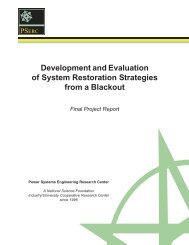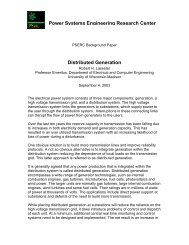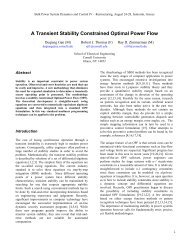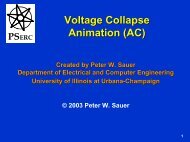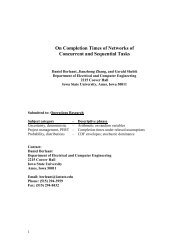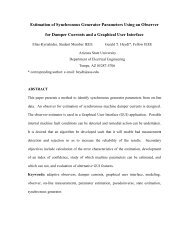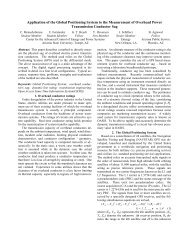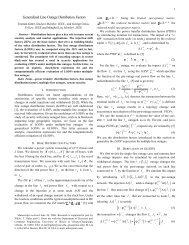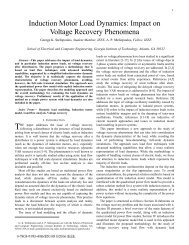symbolic dynamic models for highly varying power system loads
symbolic dynamic models for highly varying power system loads
symbolic dynamic models for highly varying power system loads
You also want an ePaper? Increase the reach of your titles
YUMPU automatically turns print PDFs into web optimized ePapers that Google loves.
CHAPTER 5<br />
CONCLUSIONS AND FUTURE WORK<br />
5.1 Conclusions<br />
This thesis proposed an innovative technique, called Symbolic Dynamics, <strong>for</strong><br />
<strong>power</strong> <strong>system</strong> load modeling. Salient features of this approach can be listed as follows:<br />
• The <strong>symbolic</strong> <strong>dynamic</strong> model is aimed at <strong>highly</strong> <strong>varying</strong> <strong>loads</strong> such as electric arc<br />
furnaces, steel rolling mills and other <strong>loads</strong> used in the steel industry where load<br />
current does not have a well-behaved waveshape. Symbolic Dynamics is best<br />
suited <strong>for</strong> cases in which a physical model is either inconvenient, inaccurate,<br />
inappropriate or unavailable.<br />
• The method is best suited <strong>for</strong> <strong>loads</strong> which have a rich set of data but perhaps a<br />
poor model.<br />
• Symbolic Dynamics utilizes only the time series historical data of voltage and/or<br />
current.<br />
• Bus voltage and/or load current signals are descretized to represent them by<br />
symbols.<br />
• States of a time <strong>varying</strong> signal can be represented by words, which are<br />
combinations of symbols.<br />
• A <strong>symbolic</strong> <strong>dynamic</strong> dictionary, <strong>for</strong>med by collecting all the words, characterizes<br />
a complete signal.<br />
• In this approach it is assumed that characteristics of the future value of load<br />
current replicate the historical data set in some manner.



